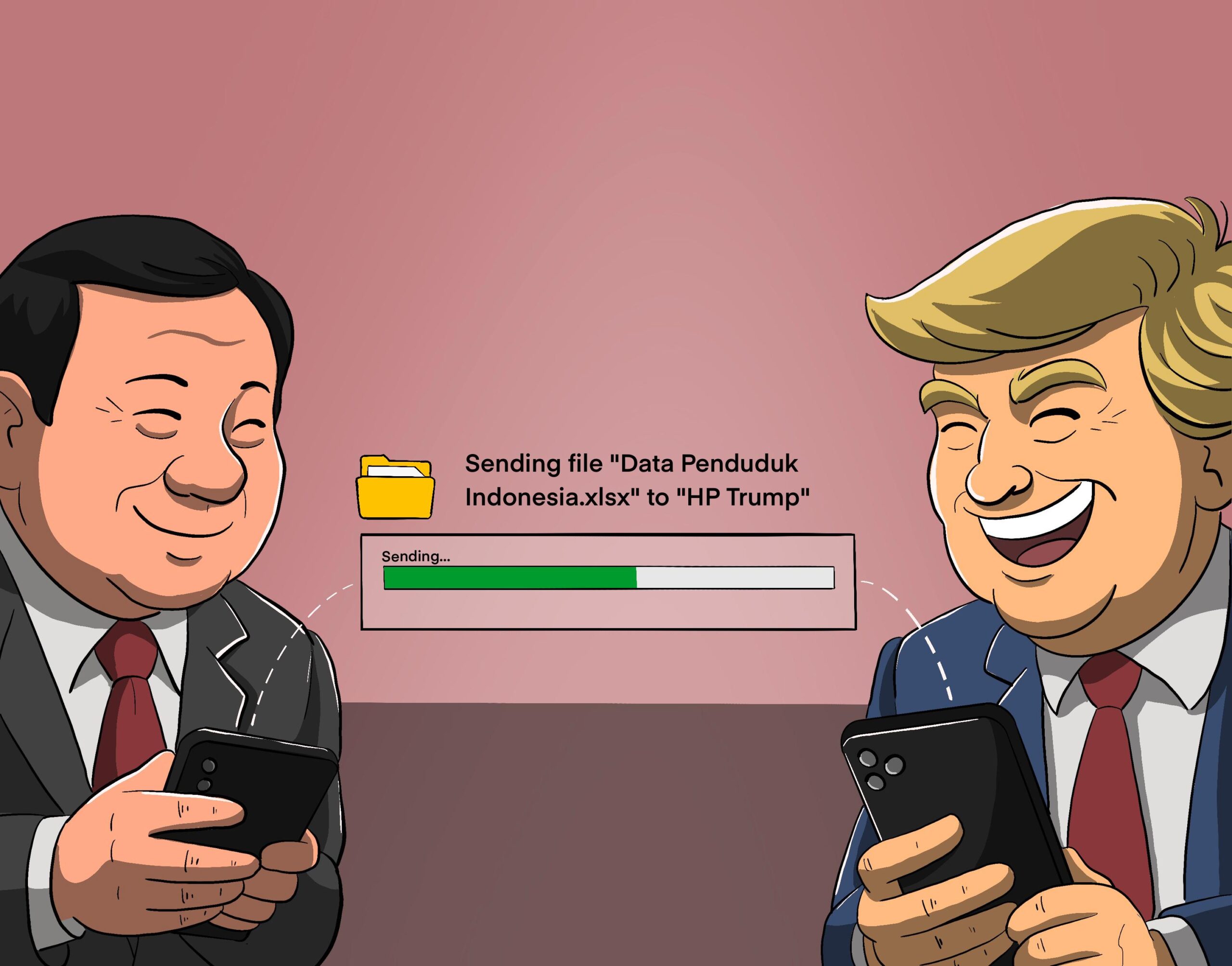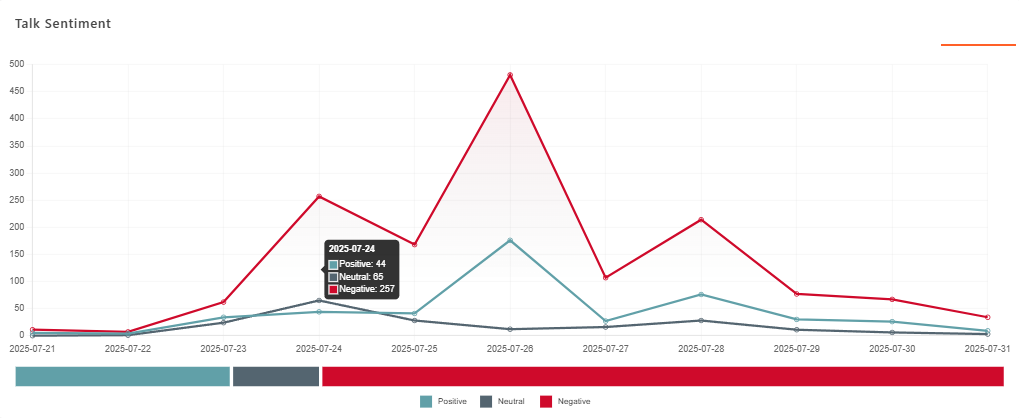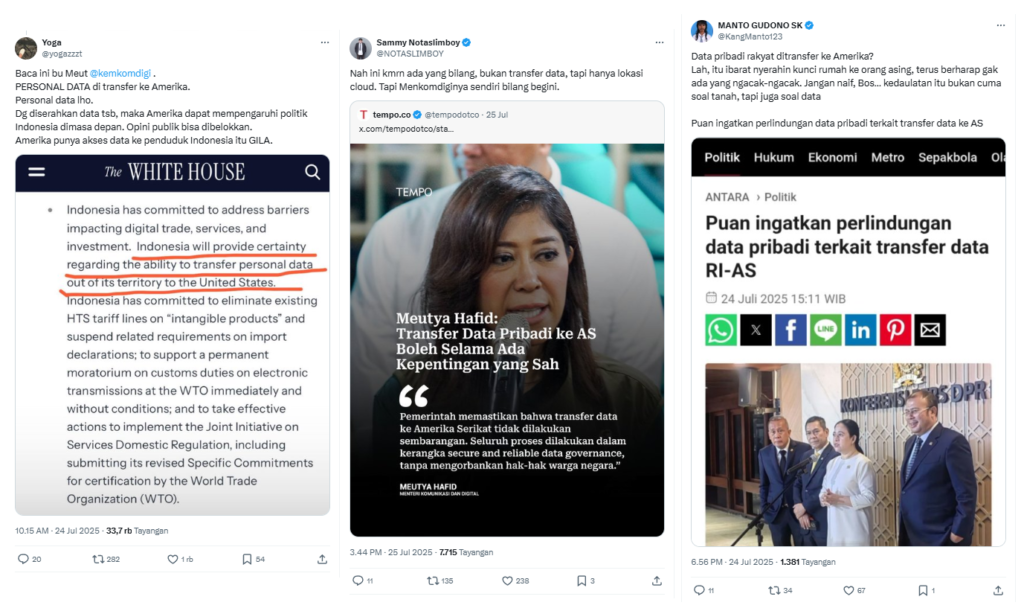From SPPG to PPPK: The Dynamics of Program-Based Staffing in Indonesia’s Civil Service Reform
The government’s decision to appoint personnel from the Nutrition Fulfillment Service Unit (SPPG) as Government Employees with Work Agreements (PPPK),…

Indonesia’s data-security debate has flared again—this time over a clause in the newly minted trade pact with the United States that permits cross-border transfers of Indonesians’ personal data.
Under the agreement—summarized in the U.S. “Fact Sheet: The United States and Indonesia Reach Historic Trade Deal” (22 July 2025)—Washington cuts its general import duty on Indonesian goods to 19 percent, well below the 32 percent floated earlier by President Donald Trump. In return, Jakarta accepts several conditions, chief among them the free flow of data to U.S. soil on the understanding that U.S. privacy standards are “adequate” under Indonesian law.
The announcement instantly sparked public worry that Indonesian data could be misused. Social media platforms lit up, and mainstream outlets devoted front-page space to the issue.

Using the Socindex social media monitoring tool, Jangkara Data Lab tracked the keyword “transfer data” on X between 21 and 31 July 2025. The platform logged:

Discussion peaked on 24 July 2025, dominated by questions about whether any transfer would truly comply with Indonesia’s 2022 Personal-Data Protection Law (UU PDP).

Most comments were negative, citing fears of PDP violations, a clash between economic gain and digital sovereignty, threats to local tech firms, and demands for transparency.


Newstensity recorded 2,678 news items in the same window, with coverage cresting on 24 July. The leading angle: government assurances that any transfer would follow the PDP Law.

National outlets led the count. Kompas.com ran 74 stories, followed by Tempo.co (65), Detik.com (55), Suara.com (42), and Antara (32).

President Donald Trump topped media mentions, trailed by Indonesia’s Digital Minister Meutya Hafid, President Prabowo Subianto, Economic-Affairs Minister Airlangga Hartarto, and Presidential Communications chief Hasan Nasbi.
Law No. 27/2022 has applied in full since 17 October 2024. Cross-border data transfer is legal only when at least one of three conditions is met (Article 56):
Article 57 keeps Indonesian data controllers fully liable after export; Article 58 empowers the forthcoming Personal Data Protection Authority (OPDP) to approve or reject transfers. Digital Minister Meutya Hafid argues the pact merely builds a lawful tunnel for data already moving through U.S.-based platforms, all under Indonesian oversight.
Deputy Minister Nezar Patria adds that if U.S. safeguards fall short of adequacy, explicit consent will still be mandatory. He aims to launch the OPDP by August 2025, ideally before the deal is finalized.
NGO ELSAM calls the agreement lopsided—serving U.S. tech firms more than Indonesian citizens—and notes that U.S. surveillance powers under FISA 702 could expose Indonesians’ data without Jakarta’s consent, echoing Europe’s Privacy-Shield collapse. Cyber-security analyst Pratama Persadha stresses the need for an independent watchdog before any large-scale transfer begins.
House Speaker Puan Maharani demands full public disclosure of what data can move and how Indonesians’ rights will be enforced.
The data clause inside the wider tariff deal has ignited a classic sovereignty-versus-commerce debate. While Jakarta vows that personal data remain safe, public skepticism persists—fed by a string of recent breaches. The challenge now is to prove that any transfer is lawful, secure, transparent, and subject to robust Indonesian oversight. Only then can economic diplomacy advance without sacrificing digital sovereignty.
Writer: Catur Noviantoro (jangkara.id), Ilustrator: Aan K. Riyadi
The government’s decision to appoint personnel from the Nutrition Fulfillment Service Unit (SPPG) as Government Employees with Work Agreements (PPPK),…
The evolution of marketing over the past few years has shown a major shift, especially as digital marketing becomes the…
Freedom of opinion and expression is a constitutional right protected by law. Today, the public’s channel for voicing disappointment toward…
In January 2026, the internet was shaken by the viral spread of a book titled “Broken Strings: Fragments of a…
The government has begun outlining the direction of the 2026 State Budget (APBN 2026) amid ongoing global economic uncertainty. Finance…
The Indonesian government, through the Ministry of Communication, Information, and Digital Affairs (Komdigi), has officially temporarily blocked the use of…
A few years ago, electric cars still felt like a far-off future. They were seen as expensive, futuristic in design,…
Hydrometeorological disasters hit three provinces in Sumatra—Aceh, North Sumatra, and West Sumatra. Tropical Cyclone Senyar, spinning in the Malacca Strait,…
The heavy rainfall in late November 2025 caused flash floods that submerged parts of Aceh, West Sumatra, and North Sumatra….
When we consider people’s decisions today—what to buy, what issues to trust, and which trends to follow—one thing often triggers…